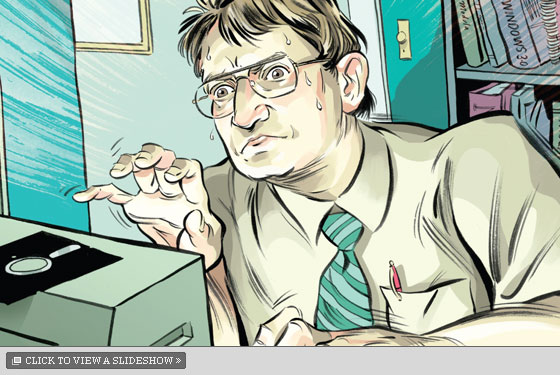
I wrote the software that turned mortgages into bonds.
Because of the news, you probably know more about this than you ever wanted to. The packaging of heterogeneous home mortgages into uniform securities that can be accurately priced and exchanged has been singled out by many critics as one of the root causes of the mess we�re in. I don�t completely disagree. But in my view, and of course I�m inescapably biased, there�s nothing inherently flawed about securitization. Done correctly and conservatively, it increases the efficiency with which banks can loan money and tailor risks to the needs of investors. Once upon a time, this seemed like a very good idea, and it might well again, provided banks don�t resume writing mortgages to people who can�t afford them. Here�s one thing that�s definitely true: The software proved to be more sophisticated than the people who used it, and that has caused the whole world a lot of problems.
The first collateralized mortgage obligation, or CMO, was created in 1983 by First Boston and Salomon Brothers, but it would be years before computer technology advanced sufficiently to allow the practice to become widespread. Massive databases were required to track every mortgage in the country. You needed models to create the intricate network of bonds based on the homeowners� payments, models to predict prepayment rates, and models to predict defaults. You needed the Internet to sail these bonds back and forth across the world, massaging their content to fit an investor�s needs at a moment�s notice. Add to all this the complacency, greed, entitlement, and callous stupidity that characterized banks in post-2001 America, and you have a recipe for disaster.
I started on Wall Street on October 5, 1985. I was 30 years old and had been writing software for six years. I originally got into it when my wife became ill and I took a job entering data, the bottom of the computer industry, at Emory University, so her rare kidney ailment could be treated. Before that, I had risked my life for $200 a week hauling shrimp 100 miles offshore from Cape Canaveral, and I had been the only white boy in my crew digging ditches in Alabama. Compared to all that, Wall Street was a country club. I recall my first day at Salomon Brothers, lingering at the windows by the elevator banks on the 25th floor of 55 Water Street. While groups of the well dressed and the professionally coiffed headed to their cubicles and offices, I stared out at the harbor, watching freighters, tankers, ferries, and garbage scows cross the great harbor. The perfection of the place was profound, the feng shui was palpable. As John Gutfreund, then the CEO, expected, I was ready to grab the balls of the bear.
My first assignment was to write a �machine-to-machine interrupt handler.� That was not exactly sexy in the world of finance, or in any world, and I won�t bore you by trying to explain. It was plumbing. As was all the programming, which, on the firm�s hierarchy, ranked somewhere above the secretarial pool but well below, literally and figuratively, the trading floor. I didn�t mind. To me, it was good, well-paying work. My manager, a former mathematics professor named Leszek Gesiak, an immigrant from Poland, became a friend. Neither one of us was on track, but we both enjoyed the challenges and pace of the job. We lunched at either Yip�s, a Chinese culinary cul-de-sac, or on Front Street, in the seaport, where you could get fresh fish cafeteria style across the street from the market. It was a different New York, still picking itself up from the seventies. Drug dealers loitered at the door of the brokerages, and taxis often smelled of pot from their previous occupants. Just a few years before, Michael Bloomberg had been fired from Salomon. He had the crazy idea that the data was as valuable as the firm�s capital.
When I asked Leszek what the busy group did that sat next to us, he told me they created mortgage-backed securities. It was an instrument, he claimed, designed to keep programmers employed. Having started to overcome my aversion to the overpaid life�I had recently bought a suit at Barneys, the old one on Seventh Avenue�I asked him how the bonds worked.
MORE:
http://nymag.com/news/business/55687/